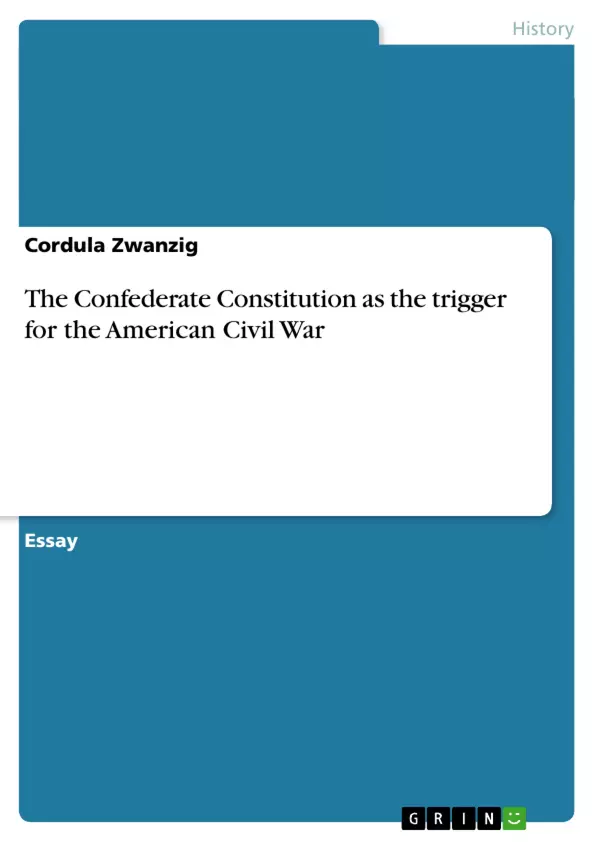As discussed a myriad of times already, the causes of the American Civil War are complex and generally known. For the purpose of this essay a three-armed scale shall be considered a visual model about the interrelation of the single factors. The three different trays of the scale contain socio-cultural, economic, and politic conflicts between the North and the South of the United States, while the centre pillar stands for the institution of slavery. The essay argues that a solid basis, namely the Constitution, could have kept the scale stable but, in fact, this very basis had been shaken actively.
Inhaltsverzeichnis (Table of Contents)
- The Confederate Constitution as the Major Reason for the Outbreak of the Civil War?
- Cultural and Social Divergence
- Economies
- Political Circumstances
- The Institution of Slavery
Zielsetzung und Themenschwerpunkte (Objectives and Key Themes)
This essay explores the complex causes of the American Civil War, arguing that the Confederate Constitution played a significant role in its outbreak. The essay uses a metaphorical scale to analyze the interrelation of various factors contributing to the war, including social, economic, and political conflicts between the North and South. Key themes explored in the essay include:- The role of the Confederate Constitution in exacerbating tensions between the North and South
- The impact of cultural and social divergence between the North and South, particularly concerning the institution of slavery
- The contrasting economic systems and dependencies of the North and South, with the South's reliance on slave labor
- The political events leading up to the war, culminating in Lincoln's election and the subsequent secession of Southern states
- The significance of the institution of slavery as the central issue driving the conflict
Zusammenfassung der Kapitel (Chapter Summaries)
The essay begins by introducing the concept of a three-armed scale to represent the interrelation of social, economic, and political conflicts leading to the Civil War. The first section discusses the cultural and social differences between the North and South. The South, characterized by its agrarian economy and reliance on slavery, developed a distinct social structure based on racial discrimination and the belief in white supremacy. This contrast is juxtaposed against the North's increasingly democratic and industrializing society. The second section examines the economic dependence of the South on slave labor. While the South benefited from the production of agricultural goods, it also relied heavily on manufactured goods from the North. The different economic systems contributed to tensions between the two regions. The third section analyzes the political events preceding the Civil War, focusing on Lincoln's election in 1860. The essay argues that Lincoln's opposition to slavery, coupled with the South's perceived political disadvantage due to the electoral system, led to the secession of seven Southern states. The Confederate Constitution, established by these states, aimed to prevent future political injustices against the South. The final section emphasizes the institution of slavery as the central issue driving the conflict. The essay highlights how the debate over slavery's extension into new territories and its morality deepened the discord between North and South, ultimately leading to war.Schlüsselwörter (Keywords)
The primary focus of this essay is on the American Civil War, specifically the role of the Confederate Constitution in its outbreak. Key themes include: slavery, social and cultural divergence, economic dependence, political tensions, secession, Lincoln's election, and the Confederate Constitution. The essay utilizes a metaphorical scale to analyze the interrelation of these factors in shaping the conflict.Frequently Asked Questions
What was the main cause of the American Civil War according to this essay?
The essay argues that the Confederate Constitution acted as a major trigger by formalizing the political and social divergences between the North and the South.
How did the institution of slavery drive the conflict?
Slavery is described as the "center pillar" that destabilized the socio-cultural, economic, and political balance between the regions.
What role did Lincoln's election play in the outbreak of war?
Lincoln's opposition to the extension of slavery and the South's perceived political disadvantage led directly to the secession of Southern states.
What were the economic differences between the North and South?
The South relied on an agrarian economy dependent on slave labor, while the North was increasingly industrializing and democratic.
What was the purpose of the Confederate Constitution?
It was established to protect the South's interests, particularly white supremacy and the institution of slavery, against Northern political influence.
- Arbeit zitieren
- Cordula Zwanzig (Autor:in), 2013, The Confederate Constitution as the trigger for the American Civil War, München, GRIN Verlag, https://www.grin.com/document/269479



